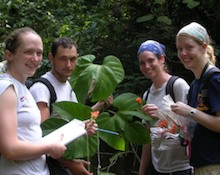Rainforest studies reveal unexpected species diversity
Marty Condon’s path-breaking research, which was featured on the cover of Science magazine in May 2008, has exposed extraordinary and surprising levels of species diversity in tropical plant/insect communities. With a 2010 $270,000 National Science Foundation grant in hand, Condon and her research team are poised to push their investigations even further.

Condon and her students and collaborators conduct the research on flowering vines in the rainforests of Central and South America and the Caribbean. They study DNA from flies that feed on the flowers, and the parasitic wasps that kill those flies.
Finding an ecological niche
Condon uses an economic analogy to explain her research and why it may change the way scientists think.
“Economists and ecologists study the same thing: how competition structures the world. Economists talk about ‘niche markets’ and ecologists talk about ‘niches.’ Both recognize that competition occurs if two businesses (or species) occupy the same niche. Intense competition in one ‘niche market’ can lead to further specialization and finer subdivisions of ‘niches.’ That kind of specialization minimizes competition. So, biologists predict that diversity of species minimizes ‘niche overlap’ and maximizes ‘niche partitioning.’
“Our discoveries fly in the face of that idea. We find repeated instances of species with 100 percent niche overlap. That is not supposed to occur. We’re on the trail of a pattern of diversity no one has ever seen before. One thing that makes this diversity so spectacular is that these are not recent marginally different species-most of these species are more than 2 million years old.”
Faculty / student research team
Cornell students are involved in all aspects of the ongoing research-fieldwork in the tropics, molecular data collection and analysis in the laboratory, and communication and dissemination of the research. They also have the chance to train in world-class research labs at the USDA and work alongside senior scientists and graduate students at the USDA, Iowa State University (ISU) and Texas A&M. Principal collaborators on the team are entomologists Sonja Scheffer and Matt Lewis at the USDA, Bob Wharton at Texas A&M, statistician and ecologist Dean Adams at ISU, and botanist Susan Swensen at Ithaca College.
Freedom to follow nature’s rhythms
Condon’s team has uncovered and named many more species than anyone expected, and she credits Cornell’s One Course At A Time calendar for providing the freedom to conduct her field work according to nature’s rhythms. Condon arranges her courses to be in the tropics during periods of greatest insect activity, and her students are similarly free to focus for a month or more at opportune times.
“I’m here at Cornell College instead of a large research university because of One Course At A Time,” said Condon, who has conducted the tropical research for over 30 years. “I’m also here because Cornell supports ‘risky’ research that might not produce something immediately-I don’t have to produce a paper every year. Nature challenges us and dares us to be different. Cornell lets us take the dare. So, students-and the scientific community-benefit from the discoveries we make.”



